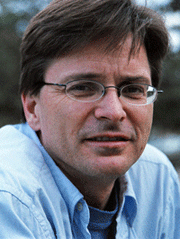This is not a September 11 speech.
This is a September 10 speech.
We all remember what we felt on September 11, 2001. I want to talk about what I felt on September 10, 2001.
I'm not talking about the inevitable pain of being human in the world, not the personal pain that comes with the unavoidable disappointment and death that is part of being human. We all cope with that, day after day, the best we can.
Instead I want to speak of the pain that is manufactured by power: The pain visited upon people in wars that are started to consolidate the power of a nation and its elite; the pain created by economic policies designed to protect the wealth of the few; the pain inflicted on people not because it must be that way but because some choose to make it that way, with no concern for others' suffering, which most of the rest of us accept without much thought, lest such thinking disturb our comfort and convenience.
When we truly come alive in the world, that pain will wash over us and force us to ask why it can't be otherwise. We will feel not only the pain of people but -- even more deeply -- the pain of a living world that is slowly being strangled by the stupidity of one particular species.
That was the pain and grief that many of us felt on September 10, 2001. Though there was nothing special about that day, on that day:
--More than half the people of the world lived on less $2 a day. That means on September 10 more than 3 billion people did not have access to the clean water, food, shelter, clothing, or medical care to provide a minimally decent life.
--About 500 children in Africa died every hour from poverty-related diseases. That means on September 10, about 12,000 children died in Africa as a direct result of an economic system which placed a high value on our comfort but no value on their lives.
--Somewhere in a farmer's field, a plow hit an unexploded cluster bomb that let loose its deadly force. That means on September 10 -- in Vietnam, Laos, Cambodia, Iraq, Yugoslavia, or Afghanistan -- someone died because of our military planners' willingness to sacrifice civilian life not only in the moment of war but for years to come.
--In Iraq on September 10 -- almost two years before the Bush administration unleashed the dogs of war there -- innocent Iraqi civilians were dying from the lack of clean water, medicine, and adequate nutrition caused by the U.S.-enforced economic embargo. On that day, 150 Iraqi parents buried children because of a policy that the Republicans in both Bush administrations and the allegedly more benevolent Democrats in the Clinton administration had deemed acceptable. Those innocent lives were "worth the sacrifice" to consolidate U.S. power.
--And on September 10, 2001, our delusions about endless consumption in a high-energy world continued to eat away at the ecological fabric of the planet. On September 10, each of us did our part to contribute to making the planet unlivable. Each of us -- some more than others, but each of us in some way -- kept living a life that is unsustainable, a life that would be impossible without the inequality produced by global capitalism and U.S. imperial adventures.
So, if my conclusion sounds harsh or uncaring forgive me, but it is long past the time to say this: There was nothing special about the pain of Americans on September 11, 2001. And there is no hope for this world until we in the United States -- the most powerful and affluent country in the history of the world -- understand that.
The deaths of 3,000 people in New York, Washington, and Pennsylvania mattered, but no more and no less than the thousands of other deaths in the world that day, and the day before, and the day before that. Or the deaths since, as the United States has used the grief of Americans to justify two illegal wars of aggression, wars to consolidate the power and control of the few, wars accepted by the many out of moral laziness and fear.
(Note: You can view every article as one long page if you sign up as an Advocate Member, or higher).





